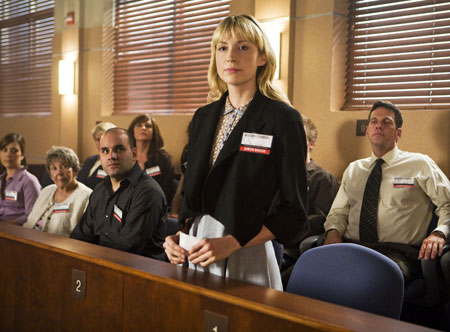Beauty can bend justice
People always say "justice has no eyes", but one study shows that the looks of the defendants can influence the court's judgment.
Livescience said Cornell University psychologists in the US invited 169 students in the school to take an online survey to find out if they were processing information based on reason or sentiment if invited to join the committee. judge in a trial. The team asked volunteers to read the records of some cases and see photos of the accused in those cases. Volunteers read instructions for jurors and listen to all arguments in court. They then have to conclude that the accused is guilty or innocent, and give the offense and detention time.
The results showed a 22% higher risk of being convicted and more severe in unattractive defendants than ordinary people. In addition, on average, their prison time is longer than 22 months.
"For those outside the prison, 22 months is not a long time. But for the prisoners, that is a very large number , " Justin Gunnell, the leader of the study, commented.

Artwork of the panel in a US court of dreamloom.com.
The team found that people in the panel can be divided into two types: emotional based reasoning and rational-based reasoning. Emotional thinkers are often concerned with factors that are not related to law, such as appearance, race, gender, or social status. They tend to think that unattractive defendants are more likely to commit crimes than those with good looks. Therefore, they often propose a more severe sentence and a longer time penalty for the accused is unattractive.
In contrast, the panel members deduced based on their reasoning with practical information, analytical methods and logical thinking before making a judgment. They never pay attention to the non-legal factors in the accused.
'We hypothesize that the panelists deduced based on sentiment are at greater risk of making mistakes and giving up criminals and sentences. Research results show that our hypothesis is correct, ' Gunnell said.
Every volunteer has a similar charge and time of trial for defendants with attractive looks. The bias toward biased accused groups of sentiments based on sentiment only drops when they face a case with clear evidence or extremely serious offenses.
'In cases where the evidence is unclear, the panel members who are emotionally inferring often say that they are innocent or give a light sentence,' Gunnell said.
Gunnell said that Cornell University research could help the judicial system change the way of judging members. According to him, currently in cases where evidence proves detrimental to the accused, defense lawyers for the accused just want to choose rational thinkers into the panel. But in cases where there is no clear evidence, prosecutors will want to bring people to the emotional conclusion.
- Everyone wants to be beautiful, but bad
- Great technology comes out - paper can also bend, fold, shape by order
- Pottery manufacturing can bend
- The Ministry of Justice will enter the blog management
- Science says: Sometimes beautiful is a crime
- Bend light brings breakthroughs in stealth technology
- The standard for 'beautiful girls' is according to science
- Be more confident with the new beauty machine, hair removal EPG
- Ancient beauty recipes up to now
- See the mesmerizing beauty of Iceland nature
- The beauty of ancient people
- Body beauty knows movement in photography
 'Fine laughs' - Scary and painful torture in ancient times
'Fine laughs' - Scary and painful torture in ancient times The sequence of numbers 142857 of the Egyptian pyramids is known as the strangest number in the world - Why?
The sequence of numbers 142857 of the Egyptian pyramids is known as the strangest number in the world - Why? History of the iron
History of the iron What is alum?
What is alum?